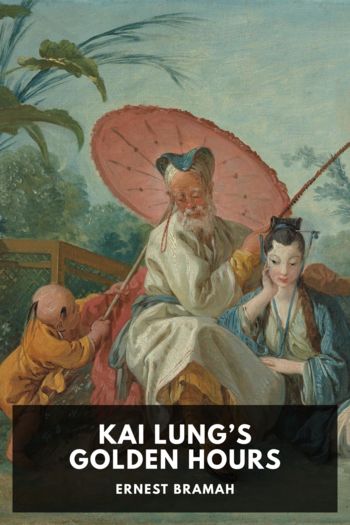Kai Lung’s Golden Hours, Ernest Bramah [sci fi books to read txt] 📗

- Author: Ernest Bramah
Book online «Kai Lung’s Golden Hours, Ernest Bramah [sci fi books to read txt] 📗». Author Ernest Bramah
“Truly they who go forth to fish, even in shallow waters, experience strange things when none are by to credit them,” suddenly exclaimed his assistant—a mentally deficient youth of the villages whom Ten-teh charitably employed because all others rejected him. “Behold, master, a spectre bird approaches.”
“Peace, witless,” replied Ten-teh, not turning from his occupation, for it was no uncommon incident for the deficient youth to mistake widely-differing objects for one another or to claim a demoniacal insight into the most trivial happenings. “Visions do not materialize for such as thou and I.”
“Nevertheless,” continued the weakling, “if you will but slacken your agile proficiency with the pole, chieftain, our supper tonight may yet consist of something more substantial than the fish which it is our intention to catch tomorrow.”
When the defective youth had continued for some time in this meaningless strain Ten-teh turned to rebuke him, when to his astonishment he perceived that a strange cormorant was endeavouring to reach them, its progress being impeded by an object which it carried in its mouth. Satisfying himself that his own birds were still on the raft, Ten-teh looked round in expectation for the boat of another fisherman, although none but he had ever within his memory sought those waters, but as far as he could see the wide-stretching lagoon was deserted by all but themselves. He accordingly waited, drawing in his pole, and inciting the bird on by cries of encouragement.
“A nobly-born cormorant without doubt,” exclaimed the youth approvingly. “He is lacking the throat-strap, yet he holds his prey dexterously and makes no movement to consume it. But the fish itself is outlined strangely.”
As the bird drew near Ten-teh also saw that it was devoid of the usual strap which in the exercise of his craft was necessary as a barrier against the gluttonous instincts of the race. It was unnaturally large, and even at a distance Ten-teh could see that its plumage was smoothed to a polished lustre, its eye alert, and the movement of its flight untamed. But, as the youth had said, the fish it carried loomed mysteriously.
“The Wise One and the Crafty Image—behold they prostrate themselves!” cried the youth in a tone of awe-inspired surprise, and without a pause he stepped off the raft and submerged himself beneath the waters.
It was even as he asserted; Ten-teh turned his eyes and lo, his two cormorants, instead of rising in anger, as their contentious nature prompted, had sunk to the ground and were doing obeisance. Much perturbed as to his own most prudent action, for the bird was nearing the craft, Ten-teh judged it safest to accept this token and falling down he thrice knocked his forehead submissively. When he looked up again the majestic bird had vanished as utterly as the flame that is quenched, and lying at his feet was a naked man-child.
“O master,” said the voice of the assistant, as he cautiously protruded his head above the surface of the raft, “has the vision faded, or do creatures of the air before whom even their own kind kowtow still haunt the spot?”
“The manifestation has withdrawn,” replied Ten-teh reassuringly, “but like the touch of the omnipotent Buddha it has left behind it that which proves its reality,” and he pointed to the man-child.
“Beware, alas!” exclaimed the youth, preparing to immerse himself a second time if the least cause arose; “and on no account permit yourself to be drawn into the snare. Inevitably the affair tends to evil from the beginning and presently that which now appears as a man-child will assume the form of a devouring vampire and consume us all. Such occurrences are by no means uncommon when the great sky-lantern is at its full distension.”
“To maintain otherwise would be impious,” admitted his master, “but at the same time there is nothing to indicate that the beneficial deities are not the ones responsible for this apparition.” With these humane words the kindly-disposed Ten-teh wrapped his outer robe about the man-child and turned to lay him in the empty creel, when to his profound astonishment he saw that it was now filled with fish of the rarest and most unapproachable kinds.
“Footsteps of the dragon!” exclaimed the youth, scrambling back on to the raft hastily; “undoubtedly your acuter angle of looking at the visitation was the inspired one. Let us abandon the man-child in an unfrequented spot and then proceed to divide the result of the adventure equally among us.”
“An agreed portion shall be allotted,” replied Ten-teh, “but to abandon so miraculously-endowed a being would cover even an outcast with shame.”
“ ‘Shame fades in the morning; debts remain from day to day,’ ” replied the youth, the allusion of the proverb being to the difficulty of sustaining life in times so exacting, when men pledged their household goods, their wives, even their ancestral records for a little flour or a jar of oil. “To the starving the taste of a grain of corn is more satisfying than the thought of a roasted ox, but as many years must pass as this creel now holds fish before the little one can disengage a catch or handle the pole.”
“It is as the Many-Eyed One sees,” replied Ten-teh, with unmoved determination. “This person has long desired a son, and those who walk into an earthquake while imploring heaven for a sign are unworthy of consideration. Take this fish and depart until the morrow. Also, unless you would have the villagers regard you as not only deficient but profane, reveal nothing of this happening to those whom you encounter.” With these words Ten-teh dismissed him, not greatly disturbed at the





Comments (0)